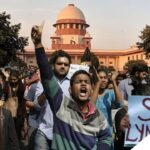Petition on EVM-VVPAT Verification
In a significant development, the Supreme Court on Tuesday heard petitions urging for comprehensive verification of Electronic Voting Machines (EVMs) against Voter-Verifiable Paper Audit Trail (VVPAT) records, with implications for the upcoming Lok Sabha elections. The bench comprising Justices Sanjiv Khanna and Dipankar Datta presided over the hearing, which lasted over two hours and saw crucial discussions on the integrity of the electoral process or EVM-VVPAT verification.
Background
Petitioners raised concerns over the susceptibility of EVMs to manipulation, citing the programmable nature of their chips and the potential insertion of malicious programs. Advocate Prashant Bhushan, representing the Association for Democratic Reforms, presented three suggestions to address these concerns, including reverting to the paper ballot system and enhancing transparency in the VVPAT verification process.
During Trial
During the hearing, the bench expressed reservations about the feasibility of manual vote counting given India’s large population, highlighting the need to strike a balance between transparency and efficiency in the electoral process. The court also emphasized the importance of minimizing human intervention to prevent potential manipulation and ensure the accuracy of election results.
Addressing the concerns raised by petitioners, Senior Advocate Gopal Sankaranarayanan underscored the need to enhance voter confidence in the electoral process and advocated for increased VVPAT verification to uphold the integrity of elections. The bench posed questions to the Election Commission of India (ECI) regarding the security measures in place to safeguard EVMs and sought clarification on the punishment for tampering with electoral machines.
The hearing also saw discussions on the challenges posed by manual VVPAT verification, with stakeholders debating the trade-offs between accuracy and efficiency in the electoral process. While petitioners advocated for enhanced verification measures to ensure fair elections, the ECI raised objections, citing concerns over the practicality and potential for human error in manual counting procedures.
Conclusion
As the hearing concluded, the bench posted the matter for further deliberation on April 18, acknowledging the importance of addressing the concerns raised by petitioners while maintaining the integrity and efficiency of the electoral process. The outcome of the hearing has significant implications for the upcoming Lok Sabha elections and underscores the judiciary’s role in safeguarding the democratic principles of transparency and fairness in elections.
Case Title: Association of Democratic Reforms v. Election Commission of India & Anr. | Writ Petition (Civil) No. 434 of 2023








